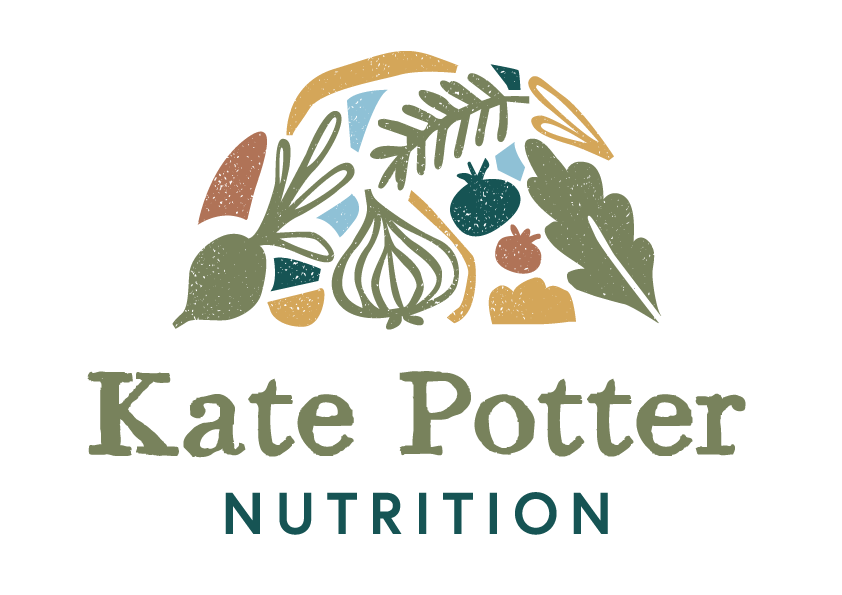Underactive thyroid / Hashimoto’s
Mainstream medicine underserves thyroid patients. Thyroid testing is often limited to looking at TSH alone, meaning that thyroid conditions may be missed or mismanaged. There is usually little interest in why the thyroid condition has arisen and what we can do about it, other than take medication.
Yet the thyroid is generally extremely responsive to diet and lifestyle changes. Underactive thyroid (hypothyroidism) and Hashimoto’s have become a huge part of my practice and I love working with these clients because they tend to respond so well.
Clients with underactive thyroid / Hashimoto’s benefit from slightly different testing, so I have created a separate thyroid package (details at the bottom of this page).
What is the difference between Hashimoto’s and underactive thyroid?
Underactive thyroid is the blanket term used for insufficient thyroid (T3) production. Often T3 itself is not tested for cost reasons. TSH is tested, and if found high, it is assumed T3 is low.
There can be many reasons for insufficient thyroid production, including specific issues with gut and liver health (where T3 is made), lack of certain nutrients, and stress, to name just a few.
But autoimmunity is often part of the picture.
Research shows that around 90% of underactive thyroid cases are thought to be autoimmune (Hashimoto’s).
Hashimoto’s is where the immune system produces antibodies to its own thyroid tissue, damaging its ability to make thyroid hormones.
It is important to know whether autoimmunity is part of the picture, because this shows us which interventions are likely to work best for that person.
What does working on your thyroid with a nutritionist look like?
Case study: Amelia
Amelia had been trying to conceive for some time and as part of her fertility tests she had been diagnosed with an underactive thyroid. Being aware of the link between thyroid and fertility, she was keen to reduce her TSH, which had come back at 5.5. Her iron levels were low, and she suffered from chronic constipation and ongoing stress.
We ran a full thyroid test for her, which showed that she was struggling to convert T4 to T3. Her thyroid antibodies were slightly raised.
Her OAT urine test showed various nutrient deficiencies and high levels of Candida, which were impacting her ability to convert T4 to T3 in the liver and gut.
We started by gently raising her zinc levels, which helped her body to correct its iron levels. This allowed her to come off the iron tablets, which were contributing to the constipation.
We used supplementation over a three month period to increase specific B nutrients and magnesium that helped her liver to detoxify more easily. B nutrients and magnesium can be depleted in times of chronic stress, and these insufficiencies can contribute to autoimmunity.
We wanted to reduce the levels of Candida in her gut because Candida was contributing to overall dysbiosis in the gut, which was impacting her ability to convert T4 to T3. We reduced added and natural sugars in her diet, making sure she had plenty of things she could still eat that she enjoyed. We also used various probiotics and herbal formulas to help repopulate her gut with beneficial bacteria to crowd out the Candida.
Amelia had symptoms of certain food intolerances, which were promoting Candida growth and increasing inflammation. The histamine produced in response to food intolerances can also inhibit progesterone, which is needed to maintain pregnancy. The risk of autoimmunity increases if progesterone is inhibited.
So we used food intolerance testing to identify the foods Amelia was reacting to. We removed and reduced certain foods temporarily.
We also helped her to support her fertility by eating according to where she was in her cycle. Oestrogen needs sugar levels to be low, so for the first half of her cycle we worked on helping her to eat in a way that kept her blood sugar levels stable at a lower level. Progesterone requires sugar levels to be a little higher, so Amelia could increase her sugar intake a little in the last part of her cycle.
Having low thyroid can actually dysregulate blood sugar levels, causing inflammation and potentially autoimmunity, so Amelia benefited from learning how to manage her blood sugar levels more effectively. She managed this by learning how to put meals together, and how to make sure she was eating certain foods alongside the higher sugar foods that would slow down the release of sugars into her bloodstream, as well as getting the meal timings right.
Lastly we worked on Amelia’s nervous system. She recognised that she was spending much of her time in ‘fight or flight’ state, with high circulating levels of cortisol. Cortisol inhibits both thyroid and progesterone production and puts the body in a more inflammatory state, raising the risk of autoimmunity. We used various techniques to calm her nervous system and help her feel safe, and she really enjoyed developing her knowledge of this area of health.
We retested Amelia’s thyroid four months later and her TSH level was now 1.1, which was well within the normal range. Her energy and mood had improved enormously, as had her digestion and sleep. Her constipation had gone, although she still had some bloating at certain times in her cycle.
Amelia reported feeling really well. She said that she liked being able to understand what her body needed, because it took away the frustration of constantly trying things without really knowing what was best. She left with a good understanding of how to look after herself going forward.
Thyroid package
Comprehensive thyroid test
TSH, fT4, fT3, TPO and antibodies (TPO and TgAb)
Private blood draw and finger prick test options
OAT urine test
Comprehensive screening test of your gut health, including dysbiosis, candida, moulds and non beneficial bacteria, key nutrients status, liver and detoxification function, toxicity, protein, fat and carbohydrate digestion and neurotransmitter function.
Four consultations
(1 x 70 mins, 3 x 50 mins)
Email support between sessions to answer any questions
Total cost of package: £1,299
If you have any questions, you can contact me here.
Also have a look at my online self paced autoimmune plan, which is particularly effective for Hashimoto’s.
- Emma, October 2025
Why did you choose to work with me?
“Reviews and specialism in autoimmune conditions as initially wanted support with Hashimoto’s.”
What have you discovered through working with me and what has changed?
“To be more patient with body changes. Many of my symptoms improved and I finally started to lose weight after many years of nothing budging so I was thrilled.”
How would you describe my approach?
“Lovely, natural style, great knowledge.”
“I would recommend working with Kate, she is very patient and reassuring. She also explained my complex test results in a very engaging way, breaking it down and making it accessible and I could then relate why I should make her suggested changes.”
FAQs
-
There is no set program. The sessions tend to be spread out over a period of 3-4 months, but it can vary depending on circumstances.
We put together the steps that we think will work best for you, based on your test results, your symptoms and case history, as well as your dietary and lifestyle preferences.
We also take into account how you are feeling at the time (enthusiastic, overwhelmed, tired, busy, etc) and adjust things accordingly.
-
Yes potentially, if they are comprehensive and within the last three months. Please contact me with the details.
-
There are no set changes that you will have to make. I will suggest things based on your test results, case history, symptoms, current diet and lifestyle, and preferred approach.
Common changes include temporarily removing foods you may be reacting to, adjusting the balance of your macronutrients (protein, fats, carbs) to regulate your blood sugar levels, increasing the ratio of whole foods to ultra processed foods to help the microbiome, optimising certain nutrients that are low on your test results, particularly where the thyroid and liver are directly impacted. We may tweak the timing of some meals, and we may use herbal supplements to help with overcrowding of certain non beneficial microbes if they show up in your test results.
We often also implement lifestyle changes around creating safety for the body to help the nervous system and the liver, such as regulating sleep, sunlight exposure and movement.
Sometimes we look at what you are eating and drinking around the time you take your thyroid medication, as many things can impact absorption of Levothyroxine.
Have a look at the case study above for more information. You can also read this blog post on thyroid and autoimmunity.
-
The OAT urine test can be done at home and the sample posted back to the lab.
There are two options for the thyroid test: private blood draw or finger prick test.
Private blood draw: this test has a slightly higher accuracy rate and so is the better option for most people. However, you will need to book a private blood draw service locally to you. The cost is usually around £30.
Finger prick test: the benefit of this option is that you can carry out the test at home and there is no blood draw fee. However occasionally people struggle with the experience of pricking their finger and collecting the blood.
In both instances you post the sample back to the lab yourself. We can discuss which option would suit you better if you are not sure.
The test results take around three weeks to come back.
-
Yes, the thyroid testing will show whether you have thyroid antibodies which are out of range.
Where antibodies are out of range, you would take the result to your doctor to confirm the diagnosis.










